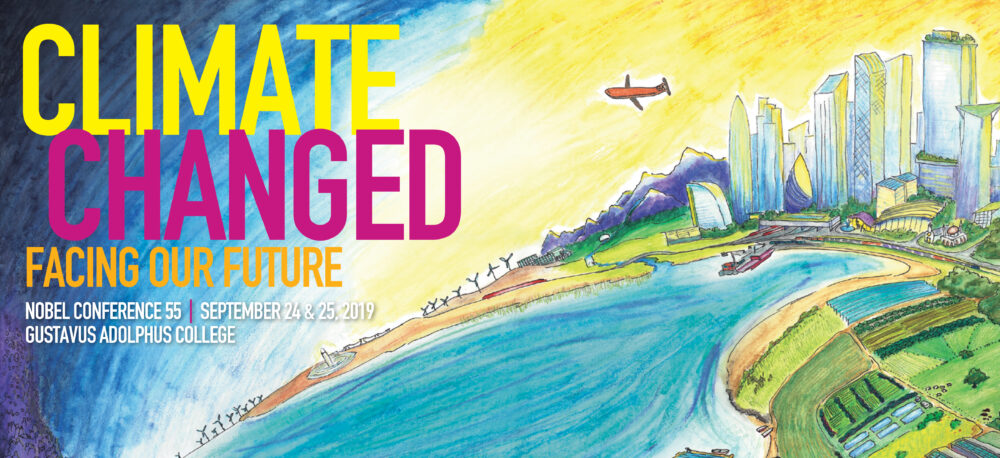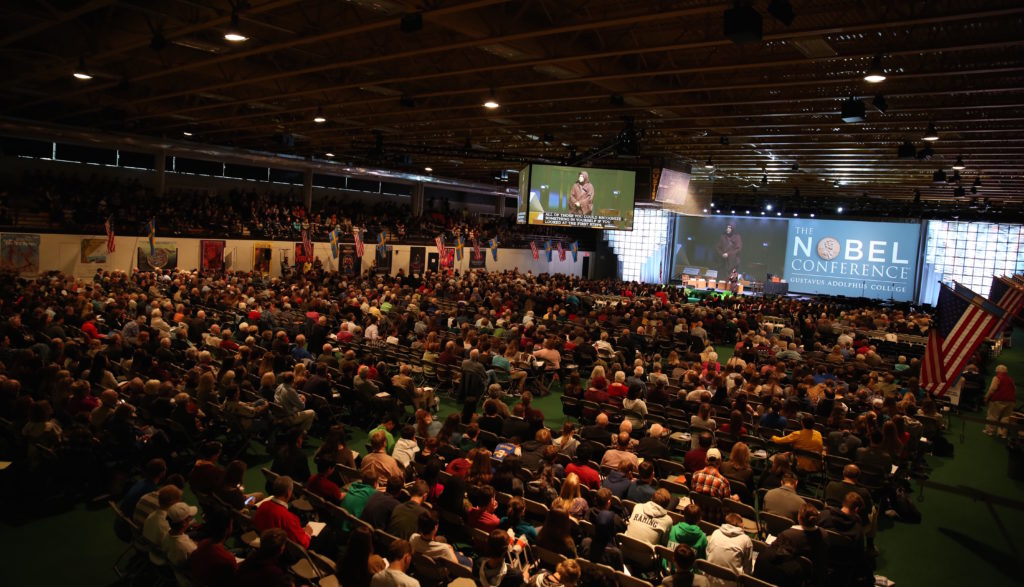
The 55th Nobel Conference will take on climate change as seven world-leading experts visit the Gustavus Adolphus College campus to discuss the causes and consequences of our changing climate September 24-25.
The conference, “Climate Changed: Facing Our Future,” asks “What tools are available, what research efforts do we require, and what kind of people do we need to be to conceptualize and address global climate challenges?”
“In one sense, climate change is a tractable problem,” explains Nobel Conference 55 Chair and Gustavus geography professor Anna Versluis. “We know the cause: raised levels of atmospheric greenhouse gases. We know their sources: human use of fossil fuels (oil, coal, natural gas), modern agricultural practices, and deforestation. And we have a straightforward solution that will more or less solve the problem: stop using fossil fuels immediately. Why, then, are global greenhouse gas emissions only increasing?”
 “We must confront a host of questions and challenges that lie at the intersection of science, society, and ethics,” adds Nobel Conference Director and Gustavus philosophy professor Lisa Heldke. “What will our future climate be like and will it be hospitable to people and other life forms? What will a fossil-free economy look like and how do we transition to it? What kinds of social and political institutions must we create to curb anthropogenic greenhouse gases? What role can and should new technologies play in managing a new global climate? How do we respond to climate change while also alleviating poverty? Whose voices get heard and whose are marginalized?”
“We must confront a host of questions and challenges that lie at the intersection of science, society, and ethics,” adds Nobel Conference Director and Gustavus philosophy professor Lisa Heldke. “What will our future climate be like and will it be hospitable to people and other life forms? What will a fossil-free economy look like and how do we transition to it? What kinds of social and political institutions must we create to curb anthropogenic greenhouse gases? What role can and should new technologies play in managing a new global climate? How do we respond to climate change while also alleviating poverty? Whose voices get heard and whose are marginalized?”
The conference will kick off with a Tuesday morning lecture by novelist and historian Dr. Amitav Ghosh, author of The Great Derangement: Climate Change and the Unthinkable. Following a panel discussion and lunch break, Dr. Richard Alley of Penn State University will discuss how studying climates of the past can inform our understanding of present climate changes and Dr. Diana Liverman of the University of Arizona will use case studies to illustrate the challenges we face when working for sustainable development and addressing risks to vulnerable populations.
After the opening day’s lectures, a series of Climate Change Workshops will invite attendees to take a deeper dive into subjects ranging from Ecuadorian glacial melt to the impact of consumer food choices to using art to engage with climate data to Indigenous responses to climate change. Day one will conclude with an reception at the Hillstrom Museum of Art’s fall exhibition, featuring works from the Dust Bowl and Depression era; an art reception in Schaefer Gallery for the exhibit Mykitas Epoch – Fungal Expansion within the Plastisphere; and a concert and poetry reading in Bjorling Recital Hall.
The second day begins with a lecture on how Arctic weather impacts all features of life in the region and serves as a bellwether for the rest of the planet from Canadian Inuit advocate Sheila Watt-Cloutier, author of The Right to Be Cold. Then, the University of Edinburgh’s Dr. Gabriele Hegerl will explain the development of climate change models and how they can be used to understand the relationships between extreme weather events and climate change. The afternoon session will feature Dr. David Keith of Harvard University on climate engineering, such as his proposal to put reflective sulfur particles into the atmosphere to cool the Earth, and the University of Cambridge’s Dr. Mike Hulme, who will discuss climate change as a cultural and social phenomenon, not just a natural one. Following another panel discussion and question-and-answer session, the Nobel Conference Banquet (separate ticket required) will conclude the 2019 event with reflections from each of the speakers.
Tickets
The 2019 Nobel Conference is sold out to the general public and high school delegations. Call 507-933-7520 with any questions or make plans to watch online. If you would like to be added to a waiting list, please submit your information on this form.
Livestreaming
The Nobel Conference will be livestreamed on the Nobel Conference website. Lectures will be archived and available for viewing on request beginning in mid-October.
About The Nobel Conference
Following the dedication of the Alfred Nobel Hall of Science in 1963 at Gustavus, the Nobel Foundation granted approval for an annual science conference to be held at the College. For five decades, Gustavus has organized and hosted The Nobel Conference, which draws about 4,500 people to the college campus in Saint Peter, Minn. The conference links a general audience, including high school students and teachers, with the world’s foremost scholars and researchers in discussion centered on contemporary issues relating to the natural and social sciences. The Nobel Conference is the first ongoing educational conference of its kind in the United States. It is made possible through income generated by a Nobel Conference Endowment and the support of annual conference contributors.
###
Media Contact: Director of Media Relations and Internal Communication Luc Hatlestad
luch@gustavus.edu
507-933-7510
Enjoyed the conference – a lot to take in – excellent speakers. So much information to absorb. Are the PowerPoint they presented available?